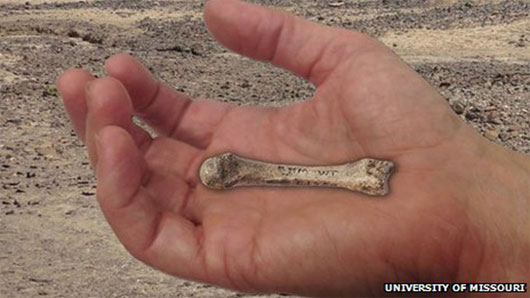Human hands evolve earlier than we think
Scientists have discovered an ancient bone in a tomb in Kenya, revealing the ingenuity of human hands evolving much earlier than previous studies.
According to PNAS magazine, on top of that bone sample is well preserved, is a bone pattern linked to the index finger, a similar structure to the hand bones of modern people.

The neck bone is found to be the oldest fossil, proving that human hands evolved earlier than previous studies - (Photo: BBC News)
This is the oldest fossil evidence, proving that human hands evolved strong enough to be able to use tools. With this discovery, scientists gradually narrowed the gap in the history of human hand evolution.
After analyzing isotopes, neck bone samples were identified about 1.42 million years old, meaning earlier than the original studies of about 600 million years.
Professor Ward, an anatomy and pathologist at the University of Missouri, Columbia (USA), said: 'The isotopic process reflects the evolution of the level of ingenuity in human hands, possibly the grasping of Arrest has not been done correctly but strong enough to handle objects'.
The bone was found in the Kaitio area, west of Turkana, near the area where the first Acheulian tools were found, they were about 1.6 million years old.
- Human hands evolved to fight
- Decoding evolution in human hands
- The human brain continues to evolve
- Tibetans evolve the fastest in the world
- Experiments show that you are washing your hands extremely 'dirty'
- Multicellular organisms may exist before the Cambrian Period
- This is human hands if they are evolved for smartphones
- Tests reveal gender from hands
- Successfully crafted a moving robot hand like a human hand
- Researchers create flexible robotic hands like human hands
- Hands freezing cold because of cold weather, what is the way to warm hands fast and safest?
- How humans will evolve in 100,000 years
 Discovered an ancient centipede fossil 99 million years old
Discovered an ancient centipede fossil 99 million years old Discovered bat-like dinosaurs in China
Discovered bat-like dinosaurs in China Discovered a 200-year-old bronze cannon of the coast
Discovered a 200-year-old bronze cannon of the coast Discover 305 million-year-old spider fossils
Discover 305 million-year-old spider fossils